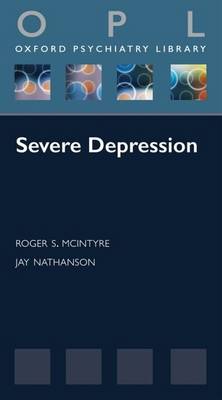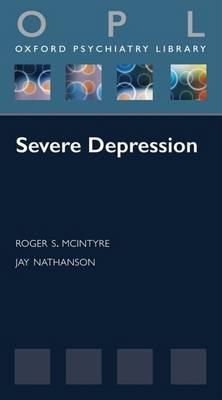
Door een staking bij bpost kan je online bestelling op dit moment iets langer onderweg zijn dan voorzien. Dringend iets nodig? Onze winkels ontvangen jou met open armen!
- Afhalen na 1 uur in een winkel met voorraad
- Gratis thuislevering in België vanaf € 30
- Ruim aanbod met 7 miljoen producten
Door een staking bij bpost kan je online bestelling op dit moment iets langer onderweg zijn dan voorzien. Dringend iets nodig? Onze winkels ontvangen jou met open armen!
- Afhalen na 1 uur in een winkel met voorraad
- Gratis thuislevering in België vanaf € 30
- Ruim aanbod met 7 miljoen producten
Zoeken
€ 33,95
+ 67 punten
Omschrijving
Major depressive disorder is highly prevalent, recurrent, and associated with inter-episodic dysfunction. Individuals with severe depression exhibit profound morbidity, co-morbidity, disability, cost, and mortality. Severe depression is a heterogeneous phenotype with a lack of standardized definition. The chronic and heterogeneous nature of severe depression results in a lower probability of spontaneous remission and often a chronic course. The complicated course of illness in severe depression results in frequent clinical visits and longer courses of therapy. Pharmacological treatment strategies for severe depression are selective serotonin reuptake inhibitors, tricyclic antidepressants, serotonin-norepinephrine reuptake inhibitors, norepinephrine-serotonin reuptake inhibitors, and monoamine oxidase inhibitors. These agents, alone and in various combinations, as well as psychosocial treatments, electroconvulsive therapy, transcranial magnetic stimulation, vagal nerve stimulation, and deep brain stimulation, are under investigation. In addition, a variety of novel augmentation strategies are being tested. Hitherto relatively few reviews, texts or monographs have focused on the diagnosis and management of severe depression. Part of the Oxford Psychiatry Library, this concise pocketbook covers the clinical features and definition of severe major depressive disorder. It focuses on current treatment strategies as well as an algorithmic approach to selecting and sequencing therapies for individuals with severe depression. Novel systematic approaches as well as psychosocial strategies will also be reviewed. This book will serve as a valuable quick reference for practitioners in mental health (i.e. clinical psychiatrists, trainees, specialist nurses, as well as primary care providers). The book will also be of interest to private sectors and researchers.
Specificaties
Betrokkenen
- Auteur(s):
- Uitgeverij:
Inhoud
- Aantal bladzijden:
- 128
- Taal:
- Engels
- Reeks:
Eigenschappen
- Productcode (EAN):
- 9780199570249
- Verschijningsdatum:
- 12/04/2010
- Uitvoering:
- Paperback
- Formaat:
- Trade paperback (VS)
- Afmetingen:
- 175 mm x 99 mm
- Gewicht:
- 117 g

Alleen bij Standaard Boekhandel
+ 67 punten op je klantenkaart van Standaard Boekhandel
Beoordelingen
We publiceren alleen reviews die voldoen aan de voorwaarden voor reviews. Bekijk onze voorwaarden voor reviews.











